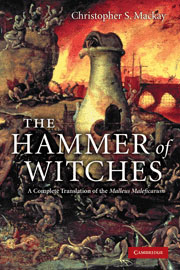The Ideas section of the Boston Globe recently interviewed our own Christopher Mackay. Mackay translated the only accurate version of the highly influential medieval witch-hunting manual – Malleus Maleficium (The Hammer of Witches). We released it as a scholarly dual-language reference set, and now as an English-only paperback.
~ ~ ~
 Harry Potter should be glad he practices his wizarding in the modern world. European sorcerers had a much less pleasant time of things in 1486, when the Malleus Maleficarum – “The Hammer of Witches” – was first published.
Harry Potter should be glad he practices his wizarding in the modern world. European sorcerers had a much less pleasant time of things in 1486, when the Malleus Maleficarum – “The Hammer of Witches” – was first published.
The lengthy tome was medieval Europe’s definitive guide to recognizing and prosecuting witchcraft, the justification for a wave of burnings-at-the-stake – largely of peasant women – that took place from the late 1400s to about 1520. And it helped spread the paranoid notion of a vast satanic conspiracy: a world where demons roamed freely, enticing women to cast spells, kill babies, interfere with procreation, and try to delay the fast-approaching End Times. (At the time, many thought the Earth’s sell-by date was 1535.)
Written largely by a Dominican friar from Germany named Henricus Institoris, republished broadly in its day, the Malleus was last translated from Latin to English in the 1920s. This month Cambridge University Press published a modern translation in a one-volume paperback, “The Hammer of Witches.” We spoke to the translator, Christopher Mackay, a professor of history and classics at the University of Alberta.
Ideas: One thing that occurred to me, reading this book, is that human nature hasn’t changed much in 450 years.
Mackay: The thing that I find most relevant to today is how you view the world around you. You see what you think you’ll see and you don’t see what you don’t think you’ll see. On “CSI,” Grissom says that the facts speak for themselves, but the facts don’t speak for themselves. It’s how you interpret the facts. [Institoris] talks about things like, you can stick a knife into a beam into your barn and you pretend to milk it, and through some razzmatazz you steal the milk from your neighbor’s cow. This is what people really thought. Onto that kind of stuff, he wants to impose this notion of this sect of heretics who are presided over by Satan.
Ideas: Was there a lot of superstition in daily life in Europe in those days?
Mackay: It depends on what you mean by superstition, because, after all, the church itself performed miracles. It’s a matter of degree. The Church has a store of magic at its command that is acceptable – that comes from God and is good – on the one hand. And you can invoke Satan to do similar things, and that’s bad.
Latest Comments
Have your say!